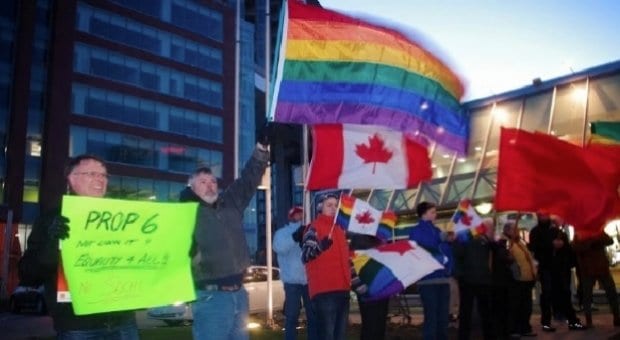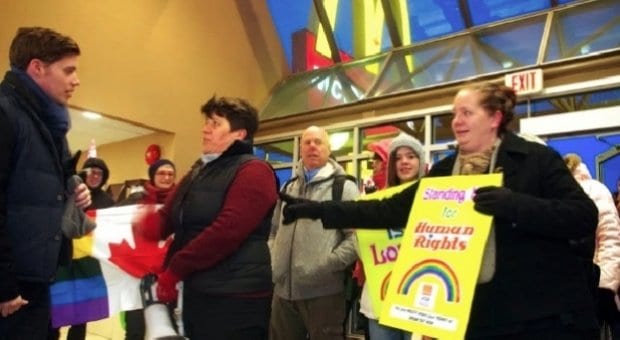
Vancouverites joined a global day of protests against Sochi Olympic corporate sponsors Feb 5, rallying outside a McDonald's restaurant at Main Street and Terminal Avenue. Credit: Nathaniel Christopher
About 80 people rallied at the McDonald’s near Main Street and Terminal Avenue Feb 5 as part of a worldwide protest against the major corporate sponsors of the Sochi Olympics.
Participants urged McDonald’s to speak out against Russia’s anti-gay laws and called upon people to email the company’s CEO. According to the online activist group All Out, this was one of 21 rallies in 15 countries that took place ahead of the opening ceremonies for the Sochi Winter Olympics.
“I’m out here to stand in solidarity with our friends from the LGBTQ community in Russia, the queers who are facing an unbelievable level of oppression, and standing up to put some pressure on the corporate sponsors like McDonald’s who are sponsoring the Olympics and letting them know they have a responsibility to stand up for human rights,” Jennifer Breakspear said. “We want McDonald’s to let the Russian government know that the law that they’ve passed and the other laws they’ve passed in that country that discriminate against members of the queer community are unacceptable.”
Last year, Russian President Vladimir Putin signed off on a federal gay-propaganda law that bans so-called propaganda of non-traditional sexual relations among minors, which effectively reinforces opposition to the staging of Pride parades and protests in support of LGBT Russians.
Many attendees at the Vancouver protest, undeterred by the cold weather and heavy winds, waved Pride flags and held signs with messages of support for Russia’s LGBT population and reworded McDonald’s slogans, one of which read, “I’m not lovin’ it.”
“The commuters that are walking by, going by in their cars, in their buses — make them think about what happens, so when they are watching the opening ceremonies they are thinking about the arrests that are going to be happening … because you know it’s all going down in Russia right now,” Denise Sheppard said. “So let’s remind people with our presence tonight not to forget those who are unseen by us right now.”
Halfway into the rally, several attendees peacefully went inside the restaurant, approached the counter and asked if “human rights” were on the menu.
“Do you want fries with that? No, I want human rights with that!” Breakspear quipped before she led the march inside.
They were quickly approached by John Gibson, McDonald’s communications manager for Western Canada, who asked them to leave the restaurant if they were not ordering anything from the menu. He declined comment but directed Xtra to a short media statement released by McDonald’s Feb 5.
“We are aware that some activists are targeting Olympic sponsors to voice their concerns regarding the Russian LGBT legislation,” the statement reads. “McDonald’s supports human rights, the spirit of the Olympics and all the athletes who’ve worked so hard to compete in the Games. We believe the Olympic Games should be open to all, free of discrimination, and that applies to spectators, officials, media and athletes.”
Vanesa Valiulis, however, believes that all Russians, and not just Olympic participants, are entitled to protection from discrimination and violence.
“It’s not fair that they are treating athletes with respect but not their own citizens,” she said. “The Olympics are a huge chance for Russia to put up a front that everything’s a-okay in their country and that all of their laws are completely fine, but they are not really consistent with what the rest of the world is starting to believe currently, which is that everyone should be able to love who they want. So essentially, why should athletes be treated with a certain amount of respect and not the citizens of the country that hosts the Olympics in keeping with principles like the Olympic Charter?”
Thai Lam says he is especially disturbed by videos emerging out of Russia that depict targeted acts of violence against LGBT people.
“I watch so many of the videos over in Russia, and it’s so disheartening seeing what people do; not only the violence in what they portray on the gay and lesbian community, but to actually film that and take enjoyment out of it,” he said. “So I can’t believe the Olympics are being held there and all these sponsors are still actually supporting that in spite of the fact that basic human rights are not being met there.”
As the rally came to a close, Breakspear called on attendees to write letters to the CEOs of McDonald’s and other major Olympic sponsors, including Coca-Cola and Visa.
“We’ve got to let them know that we tried asking for human rights,” Breakspear said. “We tried asking them to show that McDonald’s, Visa and Coca-Cola can’t just use the LGBT community as a marketing message, but rather that they’re willing to stand up for us. If they can’t give us human rights, then we take it to CEOs.”
Before cutting his Visa card in half Feb 5, Michael Cashman, a Labour member of the European Parliament (MEP), told fellow parliamentarians that he trusts that athletes will speak out in Sochi against Russia’s anti-gay laws, adding that he condemns sponsors like Coca-Cola, McDonald’s and Visa for their continued support of the Games.

 Why you can trust Xtra
Why you can trust Xtra


